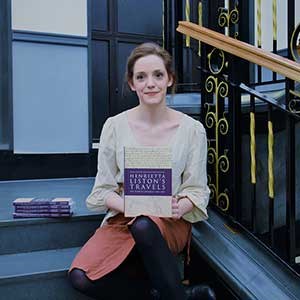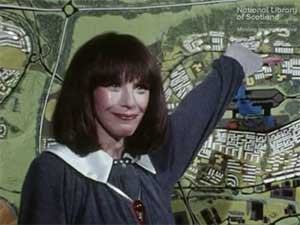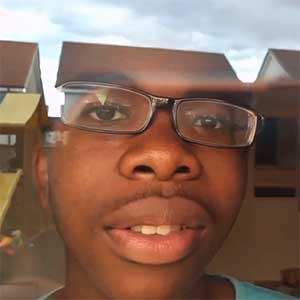Supporting learning, research and discovery
Digital scholarship
We have been able to continue, complete and begin new digital scholarship projects using the Library's datasets (collections as data) throughout the Covid-19 lockdowns.
Dataset releases continued as planned, with one dataset published every month on the Data Foundry (the home of our datasets). These included a collection of nearly 1,800 Broadsides printed in Scotland; a series of Royal Navy, Royal Air Force, British Army and Casualty lists from the First and Second World Wars; geospatial data relating to the Stevenson Maps and Plans of Scotland; and the diaries of Marjory Fleming — our first artificial intelligence-generated dataset using Transkribus software.
Artist in residence
Martin Disley, the Creative Informatics-funded artist in residence, completed his final project at the end of August 2020. His pieces applied Generative Adversarial Networks (GANs) — a type of machine learning technique — to the Library's digitised map collections, creating maps of a computer-generated Scotland which never existed.
Martin's work involved working closely with artificial intelligence and machine learning, which enabled him to see first-hand how these technologies have the potential to be wielded as instruments of power. It struck him that the same was true of the map. Much like AI, cartography has the potential to advance any combination of insight and lies, to construct reality as much as represent it. His final piece was shortlisted for the John Byrne Award.
National Librarian's Research Fellowship in Digital Scholarship
Giles Bergel (University of Oxford) joined the Library as our first National Librarian's Research Fellow in Digital Scholarship, to explore the use of computer vision techniques with our Chapbooks Printed in Scotland dataset, which contains nearly 3,000 chapbooks.
The dataset is based on the Lauriston Castle collection, which came to the Library in 1926 and provides an unrivalled overview of the Scottish chapbook tradition.
Giles said: 'The National Library of Scotland's Data Foundry includes a large dataset of Chapbooks Printed in Scotland dating from between 1700 and 1900.
'Chapbooks were small, cheap books sold by travelling pedlars or chapmen. They comprise one of the most accessible forms of literature of their day and were often illustrated by means of reusable woodblocks or metal plates. These blocks or plates sometimes offer clues as to the time, place and circumstances of their printing, as well as demonstrating what was available to their readers.
'As the National Librarian of Scotland's Fellow in Digital Scholarship, I was excited to combine my interest in chapbooks with my work as a member of the University of Oxford's Visual Geometry Group (VGG). My VGG colleagues (in particular, Dr Abhishek Dutta) and I have been applying computational methods to trace the use of individual blocks and their copies, and classify the subject of the illustrations using machine learning (or AI). Working with leading chapbook scholar Dr Iain Beavan, we have identified the printer or place of publication of numerous chapbooks and have begun to explore the range of imagery. All outputs will be made freely available for future researchers.'
Jupyter notebooks
We published a series of Jupyter Notebooks exploring Data Foundry (home of our datasets) collections. Jupyter Notebook is a web application which allows people to write and interact with live code; Notebooks are often used in a learning and teaching environment.
We recruited a Digital Research Intern, Lucy Havens, who created Notebooks which provide initial analysis of five datasets. These will enable researchers to understand what the dataset contains, and to begin to frame initial research questions using the data.
The Notebooks also enable those who cannot code to analyse collections which would otherwise be impossible to explore. The project also involved setting up a GitHub account for the Digital Scholarship Service, where we hope to share more code in the future.
The Notebooks launched on their target date, in time for the start of the academic year in September, and were well-received internationally.
Design informatics student projects
We continued our collaboration with the University of Edinburgh's Design Informatics course, with students using Data Foundry datasets to learn about data visualisation.
This year, students created websites, videos and 'data comics' of our Encyclopaedia Britannica dataset, as well as Britain and UK Handbooks and the Scottish School Exam Papers collection.
All of these projects are now featured on the Data Foundry website.
The visualisation by students Anastasia Athanatou, Yidan Yuan, Yongchang Zhu and Jingyi Chu of the Scottish School Exam Papers includes an analysis of gender bias in the collection.
Research collaborations and news
New resource on African American revolutionaries
We launched a new online learning resource in March 2021: 'Struggles for Liberty: African American Revolutionaries in the Atlantic World'. It shares the lifelong fight for social justice by African American freedom fighters, some of whom campaigned in Britain and Ireland in the 19th century.
The resource is structured by theme: the Story of the Slave; the History of Black Abolition; the US Civil War; African American activists in Scotland; and the Anna Murray and Frederick Douglass Family.
It also includes interactive maps and downloadable learning activities for teachers, including activities mapped to the Curriculum for Excellence.
'Struggles for Liberty' features writings authored by prominent African American reformers, freedom fighters and campaigners, including Frederick Douglass (1818-1895), below left, Maria W. Stewart (1803-1879), Nathaniel Turner (1800-1831) and Sojourner Truth (1797-1883).
Their histories are told through books, letters, photographs and other original documents held at the National Library, in the Walter O. Evans Collection (now at Yale), and in other US library and archive collections.
'Struggles for Liberty' was created in collaboration with collector Dr Walter O. Evans, and academic partners in the US and the UK, particularly with the Arts & Humanities Research Council-funded University of Edinburgh project, Our Bondage and Our Freedom. It can be found in the Learning Zone on our website.
Centre for History of the Book placement
Bryony Pillath, MSc student in Book History and Material Culture at the University of Edinburgh, completed a 'virtual placement' with us in early 2021 to help with a bookplate project.
Since March 2020, curators have been entering the details of a paper slip catalogue of our bookplate collections into a spreadsheet. The goal is to provide an online resource which will enable people to search more than 25,000 individual bookplates, dating from the 17th to the mid-20th centuries, which are held in albums.
Bryony focused on around 1,000 bookplates of Scottish owners and institutions. She analysed the entries on the spreadsheet according to profession and gender and provided modern geographical locations for bookplates which had place names, and researched individual owners.
Bryony has provided a valuable model for how we might present the data once the project is complete.
Library joins prestigious European consortium
We were delighted to receive news in September 2020 that the Conference of European National Librarians (CENL) — a network of 49 national libraries representing 45 countries — had accepted the National Library of Scotland for membership.
Members of the CENL are national librarians of the member states of the Council of Europe. Since 1987, CENL has worked to advance the cause of Europe's national libraries, reinforcing our special role in preserving the continent's cultural heritage and making it accessible to all.
In accepting the offer of membership, National Librarian Dr John Scally said: 'I am very pleased that our application to join CENL has been accepted by the membership.
'At the National Library of Scotland, we have had a long-held ambition to be part of CENL — and in one of the most difficult years for decades, we have arrived! We very much look forward to working with our national library colleagues from other leading European memory institutions to advance our collective mission.'
International scholarly collaboration on Henrietta Liston

'Henrietta Liston's Travels' book.
Two hundred years after her departure from Ottoman Istanbul (Constantinople) the Turkish journals of Scottish diarist and botanist Henrietta Liston were published for the first time in October 2020 in a new book, 'Henrietta Liston's Travels: The Turkish Journals 1812–1820'.
In 1812, Liston travelled to the heart of the Ottoman Empire when her husband was appointed British Ambassador to the Sublime Porte. Over almost eight years' residency, Henrietta, as diplomat's consort, kept up 'a friendly intercourse with all mankind'. She kept travel journals which are preserved in the Liston Papers archive at the Library.
Liston's enquiring voice takes us with her to walk through Constantinople 'as much incognito as possible', to watch pilgrims depart on the Hajj, to see burial grounds full of victims of the plague, and to marvel at Mount Olympus. She is fascinated by the mosques, the practice of Ramazan, and by sultanic power. Full of opinion, curiosity and wonderment, Liston's writing shows her consciousness that she looked at Turkey with the 'eye of a stranger' and reveals her awareness of her role in the Anglo-Ottoman relationship.
An informed observer of international politics, Liston writes about Sultan Mahmud II, the Ottoman elite and the European diplomatic corps with discernment and wit. Her journals demonstrate her political nous and sensitivity to the politics of character. She looks at the reputation of the men she encounters and weighs it in the balance.
Published by Edinburgh University Press, 'Henrietta Liston's Travels' is a collaboration between Dora Petherbridge (National Library of Scotland) and Patrick Hart and Valerie Kennedy (Bilkent University, Ankara).
The project was made possible thanks to the kind support of the American Patrons of the National Library and Galleries of Scotland. It is accompanied by a freely available digital resource on our website.
Wee Windaes wins Project o the Year
Founded in 2018, the Scots Language Awards give recognition to the many dedicated people who have worked tirelessly to make sure that the Scots language is kept to the fore in culture, music and words.
We're delighted our Wee Windaes website won this year's Project o the Year prize , receiving the majority of the public's votes and facing stiff competition from other organisations.
We launched the website at the end of 2016 as part of the first Scots Scriever residency held by Hamish MacDonald, funded by Creative Scotland. It showcases digitised collection material written and published in Scots since the 15th century. Many unique and rare items are available digitally for the first time on the site. Since then, the site has grown to include contributions and research from academics and Scots language researchers.
Working with schools
Through our Learning Zone and the Scotland on Screen website, we provided vital learning resources for teachers, pupils and parents over the past year, which was particularly useful for those home-schooling during the pandemic.

The 'Oor Wullie' site had 79,000 views. All Learning Zone resources had more than 138,000 views — an increase of more than 35 per cent on the previous year.
Scotland on Screen had more than 87,000 views, an increase of around 20 per cent on the previous year.
The most popular lesson guides were 'New Towns' (right is Fenella Fielding in 'Cumbernauld Hit') and 'Her Century: Scottish Women on Film'.
During lockdown we put together a home learning pack about cinema in Scotland, encouraging families to put on their own film shows using archive footage. We provided colouring sheets for younger learners and a film poster template for older children to advertise their movie premieres.
We collaborated on several projects with Into Film Scotland and co-produced a new literary resource drawing on the archive film 'From Scotland with Love'. It contains video tutorials and a range of activities for learning about film heritage.
We also partnered with Into Film Scotland and the Scottish Youth Film Foundation to deliver online workshops about 'Her Century: Scottish Women on Film'. Led by Invisible Women — an archive activist film collective which champions women film-makers — the workshops explored race, identity and politics.
Finally, we worked with Into Film Scotland to develop learning materials on early cinema for schools and young audiences as part of Hippfest 2021, a silent film festival.
Engaging audiences
Connecting people with culture and heritage
Like many comparable organisations, our online visitors grew exponentially as a result of the building closures, so we developed a range of online activities to inform and entertain people, but also to connect them in the only way we could.
Starting in early spring 2020, we ran a series of blogs called 'Letters to the Library'. We invited colleagues from the culture, heritage and information sectors to write about their experience of lockdown and working from home. We received 'letters' from the Library of Trinity College Dublin, the Medical Libraries at the University of Edinburgh, Donegal County Archives (Ireland), the University of Strathclyde, and the Library of the Royal College of Surgeons. Published on our website and promoted on our digital channels, we aimed to give people a sense of connectivity and camaraderie, as many letter writers were conveying similar experiences.
We published and promoted other series, including 'Zoom into Scotland', a fortnightly blog looking at Library resources for each local authority area, and 'Curators' Favourites', where our curators recommended inspiring and favourite reading from the collections, all freely available online. All blogs are still available on our website.
Youth Gaelic project
In December 2020 we launched a new Gaelic youth project, working with high school pupils from Edinburgh, Inverness and Portree. The project was led by Rona Wilkie, a Gaelic-speaking freelance educator, and was inspired by 'Petticoats and Pinnacles' – an exhibition about Scotland's pioneering mountain women now on at George IV Bridge.
The pupils took part in a series of online sessions relating to the topics of women and mountaineering, producing a series of creative responses including new written, digital, and artistic works.
In Rona's words: 'Leis gu robh Gàidhlig againn, bha sinn cuideachd a' sgrùdadh na h-eachdraidh bho shealladh Ghàidhealach agus a' dèanamh coimeas eadar cultaran tùsanach agus boireann 's na beanntan. Gach seachdain bha gnìomh aig na sgoilearan ri dhèanamh, agus fhuair sinn eisimplearan fìor mhath de sgrìobhadh, ealain agus ceòl bhuapa.'
'Given that we had Gaelic, we also looked at the history from the Gaelic perspective, and we compared indigenous and female perspectives of the mountains. Each week the students had a task to complete, and we received excellent submissions of literature, art and music.'
The project was supported by Baillie Gifford.
Events move online
After the cancellation of our entire on-site events programme caused by lockdown in March 2020, we swiftly developed a new series of online webinars.
Within seven weeks we launched our first virtual event via Zoom. By the end of 2020-21, we delivered 74 webinar events reaching 9,023 attendees — an increase of 57 per cent in comparison with figures for the same period in 2019/20.
UK-based audiences made up the majority of attendees for our online events programme but we also reached new international audiences who joined us from 70 countries and six continents.
Post-event surveys revealed that we reached a high number of people who have not previously engaged with the Library. On average, 68 per cent of our event attendees were not Library members and 35 per cent had not attended a Library event before.
Survey feedback indicates a strong desire from both domestic and international audiences for the continuation of online events in the post-pandemic world. This is predominantly due to convenience for those who live outside Scotland's Central Belt and for accessibility reasons.
It's highly likely we will consider a hybrid model in the future to continue to serve people who don't live in Edinburgh and Glasgow. Using Zoom as a conduit enabled us to upload recorded, edited and subtitled events to YouTube and Facebook. As of the end of March 2021, recorded webinars were viewed 17,020 times on YouTube and 35,962 times on Facebook.
Event highlights
Staff talks
A series of public talks by staff, ranging from curators to conservators, showcasing the Library's collections and behind-the-scenes work.
Gaelic events
We hosted three webinars on various aspects of Gaelic language and culture, which included partnerships with the City of Edinburgh Council and featured speakers from BBC Alba, Bòrd na Gàidhlig and the University of Edinburgh.

© Evan Harvey Photography.
Library Fest
3–6 August 2020
A series of events showcasing the diversity of the Library's online programme, with music from singer-songwriter Alannah Moar, a compilation of films from past Edinburgh festivals, live storytelling and online lectures.
The Rankin Files: Lifting the Lid
17 December 2020
An in-conversation event with Ian Rankin and Project Curator Rosemary Hall, attended by our largest audience of 487 attendees.
Elizabeth Soutar Bookbinding Award
25 February 2021
A showcase event with presentations from the winners of the 2020 Elizabeth Soutar Bookbinding Competition.
Lift the spirits with Alexander McCall Smith
16 March 2021
An in-conversation event with Alexander McCall Smith, chaired by Serena Field.
Edinburgh College of Art collaboration
Every year we work with Edinburgh College of Art students to creatively respond to an upcoming Collections in Focus display. In 2020, students produced a series of risograph prints inspired by collection items from the planned 'Stevenson Lighthouses' exhibition.
The prints resulted from a visit to the Library, where students were inspired by material relating to the Stevenson engineering family; the builders of most of Scotland's lighthouses.
Their imaginations were further fired after hearing true stories and legends of the sea.
As the works could not be displayed on-site, they were displayed in an online exhibition, 'Sea and Light', on our website.
For the 2021 project, students are developing artwork inspired by Walter Scott's 'The Heart of Midlothian'.
The work will either be shown as part of the Scott 250 Collections in Focus display or in a digital format later this year.
Families programme
Our new families programme at George IV Bridge started in early 2020, so it unfortunately came to an abrupt end with the first lockdown.
However, over the past year we continued to trial new ways of expanding our family engagement digitally — arguably during a time when families stuck at home needed it most. We created a series of family activity web pages inspired by the 2020 Year of Coasts and Waters, featuring audio stories, craft activities and links to the collections.
We also delivered a series of family-friendly virtual storytelling events with storyteller Anne Hunter, on the theme of Scottish traditions and tales. We're developing family-friendly trails to complement major exhibitions in the future, and we plan to resume our on-site family offer as soon as it is safe to do so.
'See You in 10 Years' project
As part of Book Week Scotland 2020, we collaborated with the Scottish Book Trust to deliver 'See You in 10 Years' — a literary time capsule containing works by six young writers aged 13 to 18.
The young people's work was placed in a time capsule designed and made by artist Ali Forbes. The works are accompanied by a new piece of writing by Val McDermid.
The capsule is now stored at the Library for safe keeping until it is due to be opened in 2030 — only then can people read what was on the young writers' minds during this most tumultuous year.
New voices for the collections
A new initiative for emerging writers saw their work added to the national collections alongside literary heavyweights at the Library.
In a bid to support artists, as well as provide a platform for the diverse voices that make up 21st-century Scotland, we invited emerging writers to respond to the year 2020.
In December 2020 we made a call for applications to 'Fresh Ink', a programme which awarded 10 emerging writers a bursary of £1,000 for creative responses to 'my experience of 2020'.
Led by poet, writer and creative practitioner Nadine Aisha Jassat, the initiative provided financial support to emerging writers and assisted their careers by establishing connections with Scotland's most prestigious literary archive.
Nadine said: 'I am delighted to be a part of the National Library of Scotland's Fresh Ink programme. Libraries are homes of stories, knowledge and listening, and I'm delighted to see the Library embodying that in its call to Scotland's emerging creatives to hear their experiences of 2020.'
We were overwhelmed with the response — 250 people applied, pitching a range of exciting and topical ways to respond to a most eventful year.
The 10 commissioned writers supplied intriguing and evocative work in poetry, prose, graphic novella, personal essays and a play. The writers are: Amy Jardine, jd stewart, Jude Reid, Mae Diansangu, Nazmi McCartney, Samantha Clark, Sean Wai Keung, Sonali Misra, and Suzy A Kelly.
All of the work is available to read on our website and was published in our magazine.
Young film-makers' competition

film-makers' competition entry,
'Brother Ghost.'
A lot of our engagement activity over the past year has been informed by the pandemic, and our annual film competition, in conjunction with the Scottish Youth Film Festival, was no exception.
A few months into the first lockdown (back when we thought it would be the only lockdown), we launched the competition asking for young film-makers to respond on the concept of 'home'.
It was a chance for young people to share their experience of the Covid-19 lockdown, and it was also a good opportunity for the Library — which is actively 'collecting Covid-19' — to ensure young people's voices were captured.
Head of Moving Image and Sound Collections, Alison Stevenson, said:
'The lockdown affected us all in different ways, making us participants in this new moment in history. Continuing to grow the national collections remains a focus for the Library, and this includes collecting content from the present day.
'It's important that we capture young people's voices and perspectives of the lockdown, including their version of "home".'
The competition was open to any young person (under 19) living in Scotland.
The winners were:
'HOME' by Grace Wilcox
(12 and under age group winner)
'My Rocket Girl' by Plockton High
School group (13-19 age group winner)
The winning films, plus four others that were shortlisted, are preserved in our Moving Image Archive.
One of the shortlisted entries — 'Brother Ghost' — was selected to be part of a collaborative short film about the pandemic, called 'Lost Connections'. 'Lost Connections' featured work from 12 UK screen archives, including the Library.
'Her Century' screenings brought to your home
We held the online premiere of the hugely successful 'Her Century: Scottish Women on Screen' — an archive film about women in 20th-century Scotland — in July 2020.
A partnership with Film Hub Scotland, 'Her Century' toured cinemas throughout the country in the lead-up to the first lockdown, and it was scheduled to be the main attraction at our George IV Bridge building over summer 2020. Unable to make that offer, we instead made it available online.
The Library's Dr Emily Munro curated the film. She said: 'The last century was a time of rapid social change in which 'a woman's place' was contested and redefined.
'I wanted to steer away from the 'monumental' moments of suffrage and the two World Wars, drawing instead on the variety of ways in which ordinary women and girls have been represented on film, as scholars, workers, mothers and friends.'
Women film-makers feature prominently, including professional documentarians such as Sarah Erulkar, Budge Cooper and Jenny Gilbertson, as well as amateur footage from Grace Williamson. The online premiere of 'Her Century: Scottish Women on Screen' was on our YouTube channel. Viewers were invited to ask Dr Munro questions using live-chat during the screening.
After the premiere, the film was made freely available for an exclusive two-month period — when it was viewed more than 5,000 times — accompanied by a temporary, dedicated 'Her Century' website.
